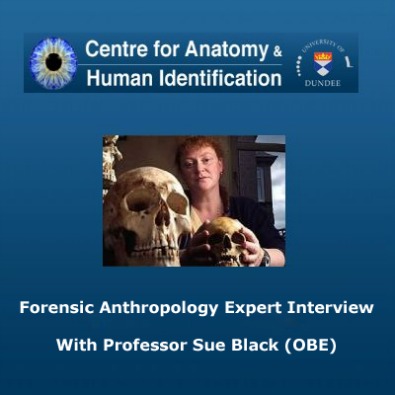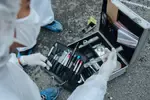Forensic Anthropology Expert Interview
Professor Sue Black is the director of the award winning Centre for Anatomy and Human Identification at Dundee University. She is a leading forensic anthropologist in the UK covering a wide variety of subjects including the detailed gross, microscopic and biomolecular analysis of adult and juvenile remains to establish all aspects of biological and personal identity including the sex, age at death, and disease and trauma status of the individual.
Professor Black has provided forensic expertise to the Metropolitan Police on a number of high profile cases and she was awarded an OBE for her International Human Identification work from mass graves.
Among her regular TV appearances, Professor Black is featured in 'History Cold Case,' a popular forensic science based archaeological human identification series from the BBC.
Want To Study Forensics/CSI?
What first sparked your interest in Forensic Anthropology?
In truth, my interest was in human anatomy and not initially in forensic anthropology and I think the same is still true today. In my third year in University at Aberdeen we were expected to dissect a human body from top to toe. It was a revelation for me and it still inspires the same awe and wonder today. My interest is in the human body and what we can tell from it. The intricacies, the detail, the variation are truly amazing and looking at the bones is such a fraction of the whole picture that anatomy surpasses osteology for me any day. That is why we require all of our future forensic anthropologists to be anatomists first. You can't understand the skeleton if you don't know about the muscles that attach to it, the nerves and blood vessels that supply it and its embryological origin.
What would you say have been the most significant advances in Human Identification during your time as a forensic practitioner?
|
This is a really tough question and I suppose the honest and most predictable answer is the revolution that has been DNA. I worry though. We tend as a society to become reliant on a holy grail that will solve all our problems. The blinkered view that can often come with that is that we don't understand all the implications of our science and indeed do not always interpret it with the caution that it requires. We saw this recently with the blind reliance on fingerprint identification which has been undermined by the McKie case and there are signs that something similar could happen with DNA. |
|
What is interesting and challenging about identification is that you are restricted to what can be done by the material that presents to you. DNA was of limited value to us in the identification of victims of the Asian tsunami as were fingerprints - it was dental information that proved to be of most value. So there is a lesson that says we must resist becoming too reliant on the latest technique and technology and ensure that we maintain a broad brush capability for identification.
You were involved in the launch of a professional Forensic Anthropology Masters. Could you tell us more about this course?
We were aware that there were skill sets required of the modern forensic anthropologist that simply are not addressed in sufficient detail in many of our existing courses. We believe the soft tissue anatomy is vital particularly if you are going to work with the recently deceased and of course in DVI. So this course is for those who have already graduated with a degree in forensic anthropology or osteology and want to increase their skill set to provide them with the capabilities requested of many forensic anthropologists working in the field today.
Is it true that you don't read crime novels?
This is such a cruel question and one that Val McDermid and Stuart MacBride will kill me for. I don't read crime and I don't watch crime. It isn't that I find myself being overly critical or anything like that, but when you do it for a job do you really want to read about it in your spare time?
Which history cold case did you personally find most interesting?
This is another dreadful confession - I didn't watch them. I think I have the perfect face for radio! Two million people watched each episode which I find amazing. It is clear therefore that they are the better judge than I of what was most interesting and judging by the volume of communications (good and bad) the case of the young London prostitute with syphilis clearly tugged at lots of heart strings. She must have contracted the disease as a child given its advanced stage and her young age. The ravaged face that was beautifully created by Caroline Wilkinson is really the most poignant part of every episode. She truly is a tremendously talented lady.
We were very struck by the case of the bodies in the well in Norwich. It was a very nervous and tense reveal to the specialists present because we knew that we were challenging history and that there would be a tremendously strong reaction to what we had to say - and we were not wrong. I hadn't expected that working with archaeological material, which is not what we normally do, would be able to elicit the same visceral responses in ancestors generations apart. It was humbling.
Could you tell us about the million for a morgue campaign?
In Dundee we have changed the way in which we embalm our cadavers. The traditional way is with formalin and we have moved to an approach called Thiel. This results in a cadaver that is incredibly flexible and lifelike to the touch. This is essential for the training of surgeons, medics and dentists and to adopt this pioneering approach we needed to build a mortuary. We were doing this at a time of huge financial austerity and so the University met half of the funds and we had to raise the other half.
We thought long and hard about who might want to have a mortuary named after them and because of my close working friendship with Val McDermid, she seemed like a very sensible person to approach. She then contacted 9 of her crime writing friends and between them they have cooked up the most amazing schemes to help us raise the one million required for our new facility. The campaign is www.millionforamorgue.com and it has become incredibly well known for its unique approach to fund raising.
How do you manage to cope emotionally with the kind of work you are faced with in places such as Kosovo?
The most important thing you can do is to be professional. You are not responsible for the situation, you did not cause it, you were not involved. Your job is to retrieve the evidence, catalogue it, analyse it and present it. You are not the judge and jury, you are just part of the chain of evidence. The best thing that you can do for your own sanity and for the security of your professional reputation is be clinical and business-like about what you have to do and how you do it. If you become emotionally affected, then your clinical detachment as an expert witness is severely impacted upon and you really need to get out of the job.
The All About Forensic Science website regularly receives questions for forensic experts. Can you help illuminate any of the following?
Most interesting/fascinating cases worked on?
The most interesting is always the one that you are working on now. A cold case review has decided to exhume some remains to determine whether the body of a child might have been secreted in an open grave over 50 years ago. If we find the child then we help to bring closure to the family (the suspect is dead) but if we don't find her then the wound caused by that missing child continues to be raw. It can be a huge responsibility and we are all very conscious that our actions do have a real effect on the survivors of incidents such as this.
Most rewarding/challenging aspects of the job?
The entirety of the job is rewarding and challenging. Every case is a challenge and if it results in an identification or a conviction then it is hugely rewarding. A large proportion of our work of late has been in the matching of suspects and offenders in cases of child abuse where a part of the offender appears in a photograph where an offence is being undertaken. Most of these are child sex abuse cases and last week a 12 year prison sentence was secured. The accused had entered a plea of not guilty and all through interrogation he had adopted the 'no comment' approach. When presented with our evidence he changed his plea to guilty on all charges. That is incredibly rewarding.
Best piece of advice for those seeking a forensic career?
Be realistic. I ask my students what they want and they say 'your job'. I remind them that it has taken me 30 years of really hard work to get here. Forensic anthropology requires experience and you have to accept that it does not happen overnight. Be in love with the science not in awe of the headlines. Truly understand and live your subject from the core.
Recent Articles
-
All About Forensic Science
Nov 12, 24 03:05 AM
A forensic science website designed to help anybody looking for detailed information and resources. -
The Role of Forensic Evidence in Criminal Defense Cases
Sep 05, 24 03:38 AM
Article exploring five key roles that forensic evidence plays in criminal defense cases -
The Evolving Role of Medical Science in Forensic Investigations
Aug 06, 24 03:35 AM
Insightful article exploring the critical role of medical science in forensic investigations.
Go From Forensic Anthropology Expert Sue Black Interview Back To The Home Page



New! Comments
Have your say about what you just read! Leave me a comment in the box below.